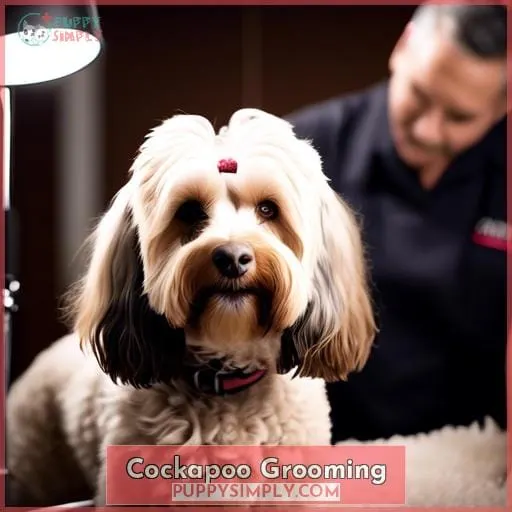This site is supported by our readers. We may earn a commission, at no cost to you, if you purchase through links.
 Imagine a world where you could have the perfect companion, a dog that’s smart, loving, and always ready to play.
Imagine a world where you could have the perfect companion, a dog that’s smart, loving, and always ready to play.
That’s the world of the Cockapoo.
This delightful breed combines the best of both worlds, the intelligence and charm of a Cocker Spaniel with the low-shedding coat and hypoallergenic qualities of a Poodle.
In this guide, we’ll uncover all the secrets of this amazing breed, from their size and temperament to their health and care needs.
Get ready to fall in love with the Cockapoo, the perfect dog for anyone seeking a loving, loyal, and playful companion.
Table Of Contents
- Key Takeaways
- Cockapoo 101
- Cockapoo History
- Cockapoo Size
- Cockapoo Personality
- Cockapoo Health
- Cockapoo Exercise
- Cockapoo Grooming
- Cockapoo Feeding
- Cockapoo Training
- Cockapoo Behavior
- Frequently Asked Questions (FAQs)
- Are Cockapoos prone to separation anxiety, and if so, how can it be managed?
- What are some of the common behavioral problems that Cockapoos may exhibit, and how can they be addressed through training or behavior modification techniques?
- How does the lifespan of a Cockapoo vary depending on its size, and what factors contribute to a longer or shorter lifespan?
- Are there any specific dietary considerations or restrictions that Cockapoo owners should be aware of to ensure their pet’s optimal health and well-being?
- What are some of the common grooming challenges associated with Cockapoos, and how can owners effectively maintain their pet’s coat and prevent matting or skin irritation?
- Conclusion
Key Takeaways
- Cockapoos are friendly, affectionate, and playful dogs with low-shedding coats and moderate energy levels.
- Cockapoos come in a variety of sizes, ranging from teacup toys to standards/maxis, so choose the size that best suits your lifestyle.
- Cockapoos are intelligent and eager to please, making them easy to train, but they may be prone to certain health issues such as hip dysplasia, eye problems, and skin allergies.
- Regular vet checkups are important for Cockapoos to ensure early detection and treatment of any health problems.
Cockapoo 101
With their friendly, affectionate nature, Cockapoos make great companions for those looking for a loving, loyal dog.
These intelligent pups are easy to train and eager to please, making them suitable for first-time dog owners.
Cockapoos come in a variety of sizes, from petite teacups to larger standards, so you can find one that fits your lifestyle.
They have a moderate energy level and enjoy playtime and walks, but they’re not overly hyperactive, making them suitable for apartment living.
Cockapoos are also known for their low-shedding coats, which make them a good choice for allergy sufferers.
With proper care and training, Cockapoos can be wonderful additions to your family, providing years of love and companionship.
Cockapoo History
Tracing the Cockapoo’s history, you’ll discover a fascinating journey of accidental breeding and intentional development.
In the 1960s, a serendipitous union between a Poodle and a Cocker Spaniel resulted in a litter of puppies that showcased the best traits of both breeds.
Word of these exceptional pups spread, and breeders recognized the potential for a new mixed breed.
Efforts began to establish breed standards and gain recognition for the Cockapoo as a true breed.
However, different philosophies emerged among breeders regarding breeding methods, leading to ongoing debates about preserving breed integrity.
Despite these challenges, the Cockapoo’s popularity continued to grow, capturing the hearts of dog lovers worldwide.
Cockapoo Size
Since Cockapoos are categorized into four sizes, you’ll find a size that fits your lifestyle.
Teacup Toys are petite pups, weighing less than 6 pounds and standing at a mere 10 inches tall.
Toys are slightly larger, reaching up to 10 inches in height and possessing a sturdier build.
If you prefer a medium-sized companion, Minis are the perfect fit, weighing between 13 and 18 pounds and standing 11 to 14 inches tall.
For those seeking a larger companion, Standard/Maxis are the gentle giants of the Cockapoo world, weighing over 19 pounds and standing at least 15 inches tall.
No matter the size you choose, your Cockapoo will bring endless joy and unconditional love into your life.
Their playful nature and affectionate demeanor make them ideal companions for families with children, active individuals seeking an exercise buddy, or those simply looking for a loyal and loving furry friend.
Cockapoo Personality
Wondering what kind of personality your Cockapoo will have?
Cockapoos inherit a blend of traits from their Poodle and Cocker Spaniel parents, resulting in a diverse range of personalities. Some Cockapoos are playful and energetic, while others are more laid-back and relaxed.
Cockapoos thrive on human interaction and companionship. They’re happiest when they’re around their family and friends. Early socialization techniques can help your Cockapoo develop good manners and prevent behavioral challenges.
Playtime strategies and training methods can help keep your Cockapoo mentally and physically stimulated.
| Temperament Trait | Socialization Techniques | Playtime Strategies | Training Methods |
|---|---|---|---|
| Friendly and Outgoing | Introduce to new people, animals, and environments | Interactive games like fetch or tug-of-war | Positive reinforcement and reward-based training |
| Intelligent and Eager to Please | Enroll in obedience classes or agility training | Puzzle toys and interactive feeders | Clicker training and shaping techniques |
| Active and Playful | Regular walks or runs in the park | Swimming or playing fetch in the backyard | Agility or dock diving classes |
| Affectionate and Loyal | Spend quality time cuddling and grooming | Massage or belly rubs before bedtime | Teach tricks and commands for bonding |
Understanding your Cockapoo’s temperament will help you provide the best care and training for your furry friend.
Cockapoo Health
You’ll want to give your Cockapoo lots of love and care throughout its life to keep it healthy.
Cockapoos are prone to hip dysplasia, eye problems, and skin allergies, so regular vet checkups are important.
With proper care, your Cockapoo can live a long and happy life.
Hip Dysplasia
You’ll also need to watch out for hip dysplasia, a genetic condition that affects the hip joint’s fit.
It’s a common concern among Cockapoos, so preventive measures are key.
Regular exercise, maintaining a healthy weight, and genetic screenings can help reduce the risk.
If your Cockapoo does develop hip dysplasia, surgical options, physical therapy, and lifestyle adjustments can manage the condition and keep your furry friend happy and active.
Eye Problems
Now, let’s look at the eye conditions Cockapoos can inherit:
- Corneal ulcers: A scratch on the eye’s surface can lead to infection.
- Retinal degeneration: This condition may cause vision loss.
- Cataract formation: This condition clouds the lens of the eye.
- Glaucoma: A buildup of pressure inside the eye can lead to optic nerve dysfunction.
Regular eye checkups are crucial for early detection and management.
Skin Allergies
Cockapoos are also prone to several skin allergies.
You should know the signs and symptoms to watch out for.
Common allergens include food, pollen, dust mites, and certain fabrics.
Symptoms can range from mild itching and redness to severe skin infections.
If you suspect your Cockapoo has skin allergies, take them to the vet for diagnosis and treatment.
Allergy management may involve dietary adjustments, environmental changes, and medication.
With proper care, you can help your Cockapoo live a long and healthy life.
Cockapoo Exercise
Continuing with Cockapoo health concerns:
- Regular exercise helps keep weight down and promotes joint health.
- Engage your Cockapoo in outdoor activities like jogging, hiking, or swimming.
- These adventures fulfill their active nature and strengthen their bond with you.
For indoor play:
- Engage your Cockapoo’s keen mind with interactive toys and puzzle feeders.
- These activities stimulate their intellect and prevent boredom.
- Consider enrolling your Cockapoo in agility classes to challenge their physical and mental abilities.
Cockapoo Grooming
Since Cockapoos have wavy or curly coats that shed very little, they need regular brushing and occasional baths to maintain their healthy appearance.
Regular brushing removes dirt and debris, prevents mats and tangles, and distributes natural oils throughout the coat.
Occasional baths keep your Cockapoo clean and fresh, but avoid bathing too frequently as it can dry out their skin.
Keep your Cockapoo’s nails trimmed to prevent them from becoming too long and uncomfortable.
Professional grooming every 4-6 weeks is recommended to keep your Cockapoo’s coat looking its best and prevent skin problems.
If your Cockapoo has skin diseases, it may need more frequent bathing with medicated shampoo.
Cockapoo Feeding
When feeding your Cockapoo, select AAFCO-approved dog food that caters to their nutritional needs.
Puppy and adult Cockapoos have different dietary requirements, so choose food specifically formulated for their age group.
Feed your Cockapoo twice daily, dividing their daily food into two meals. Portion control is key to prevent overeating and weight gain.
Consider dietary considerations like allergies or sensitivities, and consult your vet for personalized recommendations.
Choose kid-friendly treats that are low in calories and high in nutrition.
Their potential for weight gain is real, so monitor their calorie intake and provide them with ample exercise.
Always buy from a reputable breeder who prioritizes the health and well-being of their Cockapoos.
With the right diet and care, your Cockapoo can thrive and be a beloved member of your family.
Cockapoo Training
How can you teach your Cockapoo to become a well-behaved companion with positive reinforcement training?
Positive reinforcement training is like unlocking a treasure chest of good behavior. Instead of scolding your Cockapoo for misbehavior, reward them with treats, praise, or playtime when they obey your commands.
Enroll your Cockapoo in obedience classes to learn basic commands like ‘sit’, ‘stay’, and ‘come’. These classes also provide a structured environment for socialization, which is essential for preventing behavioral problems.
Socialization techniques help your Cockapoo adapt to various situations and interact positively with other dogs and people.
Tap into your Cockapoo’s potential for playfulness by incorporating games into training sessions. Engage them with interactive toys, fetch, or agility courses. By making training fun and rewarding, you’ll create a strong bond with your Cockapoo and shape their behavior effortlessly.
Cockapoo Behavior
Generally friendly and easygoing, you’ll find Cockapoos are curious and playful companions.
Their cocker spaniel heritage lends them a zest for life and a potential for playfulness that makes them a joy to be around.
Cockapoos are highly adaptable and can thrive in various living situations, from bustling city apartments to sprawling countryside estates.
To ensure your Cockapoo’s happiness and well-being, prioritize socialization techniques from puppyhood.
Expose them to diverse people, animals, and environments to build confidence and prevent anxiety.
Understanding their communication cues is crucial; watch for subtle signs of discomfort or excitement to address their needs promptly.
Environmental enrichment is key to keeping your Cockapoo mentally stimulated and happy.
Provide interactive toys, puzzle feeders, and safe spaces for them to retreat when overwhelmed.
Regular bonding activities, such as walks, playtime, and cuddles, strengthen your connection and create a harmonious household.
Frequently Asked Questions (FAQs)
Are Cockapoos prone to separation anxiety, and if so, how can it be managed?
If you welcome a Cockapoo into your life, be prepared for its potential separation anxiety.
To manage it:
- Create a routine.
- Provide interactive toys.
- Consider desensitization training.
This loving breed thrives on companionship, so don’t leave it alone for extended periods.
What are some of the common behavioral problems that Cockapoos may exhibit, and how can they be addressed through training or behavior modification techniques?
Imagine your Cockapoo, Buddy, barking incessantly at strangers.
To address this:
- Enroll Buddy in socialization classes to help him feel comfortable around new people.
- Try desensitization training, gradually exposing him to strangers while rewarding calm behavior.
How does the lifespan of a Cockapoo vary depending on its size, and what factors contribute to a longer or shorter lifespan?
Your Cockapoo’s lifespan can vary depending on its size.
Smaller Cockapoos tend to live longer, with an average lifespan of 15-18 years.
Larger Cockapoos typically live for 10-12 years.
Proper nutrition, exercise, and veterinary care all contribute to a longer, healthier life.
Are there any specific dietary considerations or restrictions that Cockapoo owners should be aware of to ensure their pet’s optimal health and well-being?
To ensure your Cockapoo’s optimal health, feed them a balanced diet rich in essential nutrients.
Avoid table scraps and excessive treats, as these can lead to obesity and other health issues.
What are some of the common grooming challenges associated with Cockapoos, and how can owners effectively maintain their pet’s coat and prevent matting or skin irritation?
Prevent matting in your Cockapoo’s coat with regular brushing.
Use a slicker brush and detangling comb.
Schedule routine grooming appointments for professional care.
Address skin irritation promptly.
Ensure your furry friend’s comfort and well-being.
Conclusion
Picture a tapestry woven with intelligence, loyalty, and playfulness—that’s the Cockapoo.
This charming breed embodies the best of both worlds, offering a loving, hypoallergenic companion that’s always up for adventure.
Discover the secrets of this remarkable dog, from their delightful personalities to their unique care needs.
Embrace the Cockapoo, the perfect harmony of brains and beauty.
















